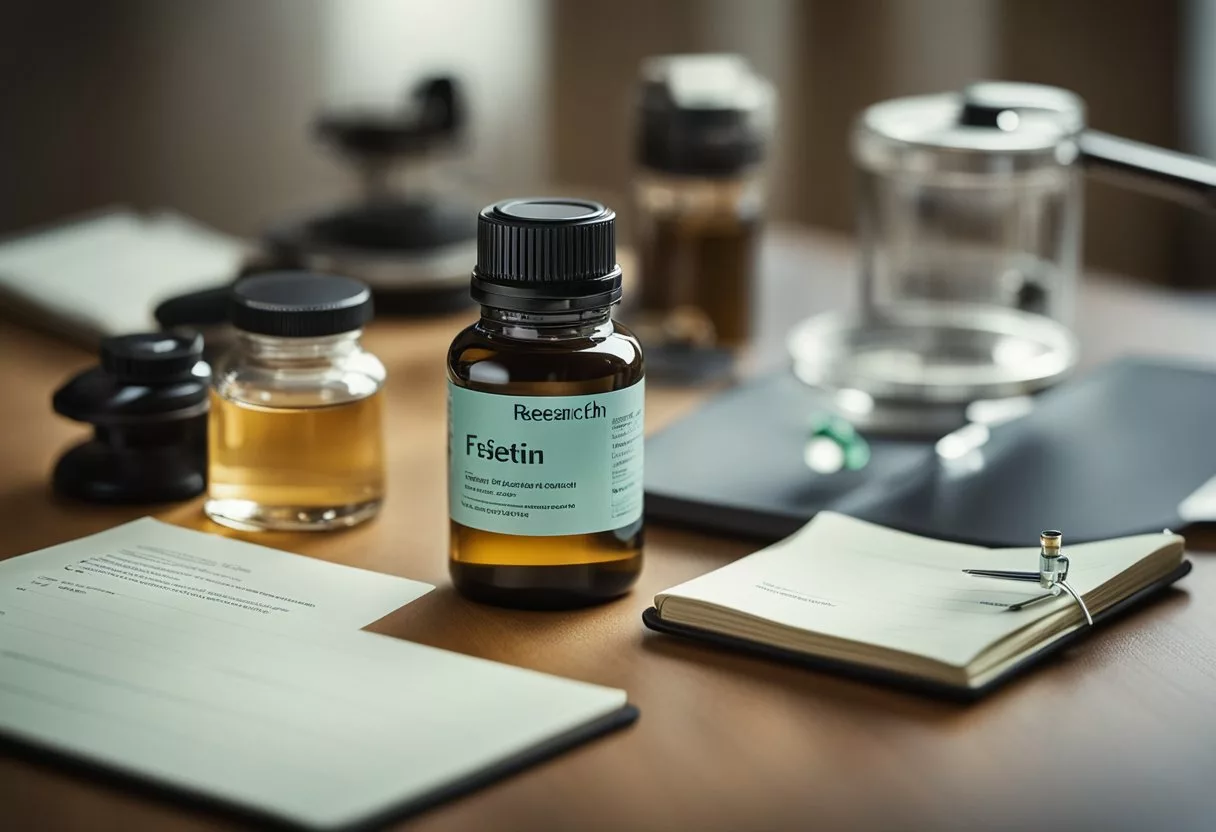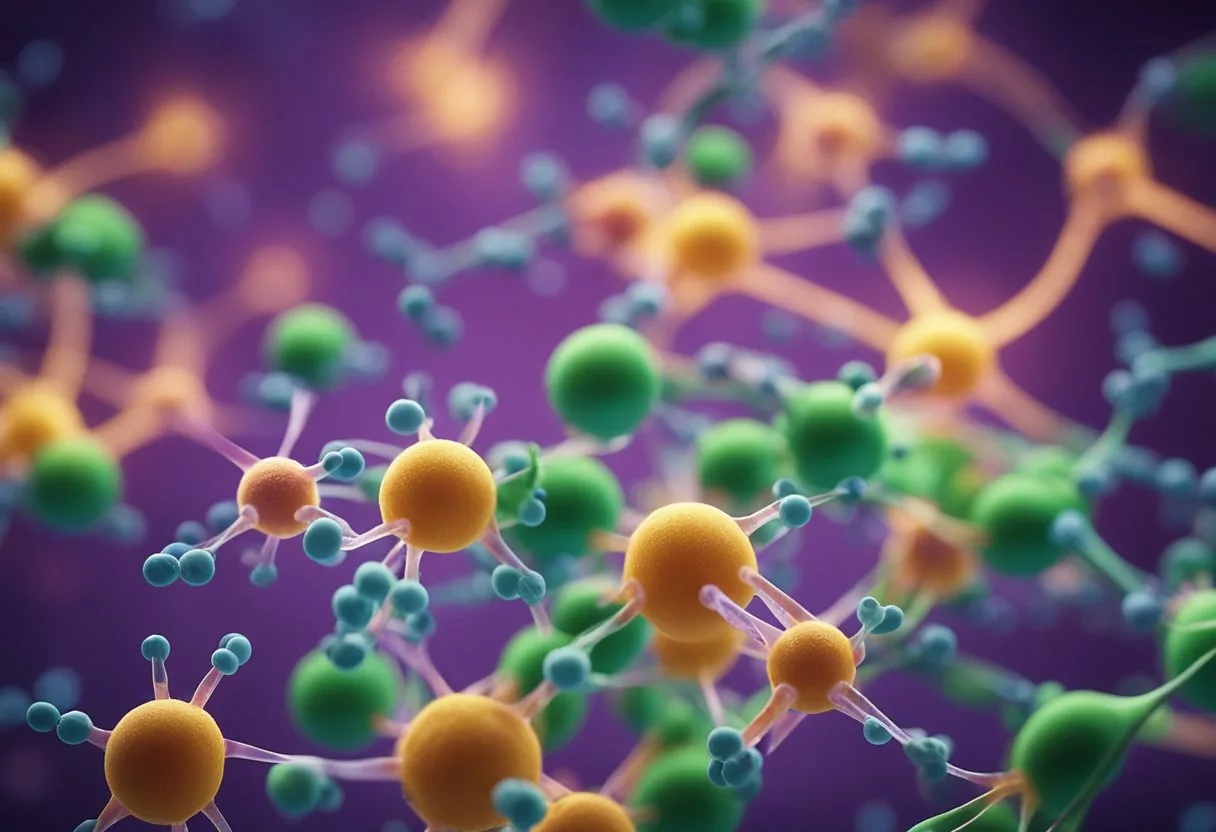Fisetin is a natural flavonoid found in many fruits and vegetables. It has attracted attention for its potential health benefits.
Research has indicated that fisetin may have positive effects on various chronic diseases. This includes its role in managing diabetes as a natural option with potentially fewer side effects than conventional diabetes treatments.
Scientific interest in this compound revolves around its anti-inflammatory, antioxidant properties, and its ability to support healthy aging. Studies have documented the extension of health span and lifespan by fisetin.

The safety profile of fisetin is also under exploration due to its low toxicity and minimal side effects observed in various studies. As a senotherapeutic agent, fisetin has been shown to selectively target and eliminate senescent cells. These cells are implicated in age-related diseases and deterioration.
This aspect, among others, is why fisetin supplementation has entered discussions within the healthcare community and amongst consumers seeking health benefits through diet and supplements.
Even as research into the dietary flavonoid continues, and its availability as a supplement becomes more widespread, understanding the mechanisms by which fisetin operates and its long-term safety remains a focus of current and future studies.
Key Takeaways
- Fisetin is being widely studied for its potential to manage chronic diseases and support healthy aging due to its anti-inflammatory and antioxidant properties.
- It is present in many fruits and vegetables and is available as a dietary supplement with a promising safety profile.
- Ongoing research is crucial to fully understand fisetin’s mechanisms of action and its long-term effects on health.
Understanding Fisetin

Fisetin is a bioactive compound touted for its potential health benefits, particularly for its role as an antioxidant. This section focuses on its chemical characteristics, antioxidant properties, and natural food sources.
Chemical Characteristics
Fisetin is a flavonoid, a specific type of polyphenol, known for its distinct yellow crystalline structure. As a bioactive compound, fisetin possesses several biological properties that may contribute to its therapeutic potential against various conditions.
Role as an Antioxidant
As an antioxidant, fisetin plays a significant role in neutralizing free radicals and reducing oxidative stress within the body. This flavonoid has been appreciated for its potential to manage chronic diseases and neurodegenerative disorders by protecting cells from oxidative damage.
Recent studies suggest that fisetin may improve long-term potentiation in the brain, which is crucial for learning and memory.
Natural Sources of Fisetin
Fisetin is naturally found in a variety of fruits and vegetables. Among the richest food sources are strawberries, apples, and onions. Grapes, persimmons, and kiwi also contain fisetin but to a lesser extent.
Including these fruits and vegetables in the diet provides a natural way to leverage the benefits of fisetin, alongside other essential nutrients found in these foods.
Health Benefits of Fisetin

Fisetin, a naturally occurring flavonoid, has attracted considerable interest for its wide-ranging health benefits, particularly related to aging and disease prevention.
Anti-Aging Properties
Fisetin demonstrates significant anti-aging abilities by targeting the senescent cells—cells that have stopped dividing and contribute to aging. Its senolytic capacity helps to clear these dysfunctional cells, reducing inflammation and promoting healthier aging.
Potential in Cancer Prevention
Research suggests that fisetin can hinder cancer progression through its antioxidant activity and anti-inflammatory effects. It has shown potential in stopping the growth of various cancer cell types, underscoring its role in cancer prevention.
Cognitive and Neurological Advantages
Fisetin has been linked to improved brain function, including memory enhancement. As a neuroprotective agent, it benefits neurons in the brain, possibly aiding in maintaining long-term memory and overall brain health.
Influence on Longevity and Healthy Aging
Supporting longevity and healthy aging, fisetin’s natural anti-aging and antioxidant properties may prolong the healthy years of life. It does this by reducing age-related cellular damage and promoting autophagy, the body’s way of cleaning out damaged cells.
Cardiovascular Improvement and Protection
Additionally, fisetin plays a role in protecting against cardiovascular disease. By mitigating oxidative stress and reducing inflammation, it helps maintain the health of cardiovascular tissues.
Fisetin’s Mechanisms of Action

Fisetin, a flavonol present in many fruits and vegetables, has been studied for its diverse biological activities. It engages with various cellular pathways to offer therapeutic potential in the treatment and prevention of certain conditions.
Senolytic and Senotherapeutic Effects
Fisetin is identified as having senolytic properties. This means it can selectively induce the death of senescent cells—cells that have stopped dividing and can contribute to aging and age-related diseases. By removing these cells, fisetin may improve overall cellular function and longevity.
Furthermore, as a senotherapeutic agent, fisetin may modulate the senescence-associated secretory phenotype (SASP). This is a key contributor to chronic inflammation in aging.
Modulation of Inflammatory Pathways
The anti-inflammatory action of fisetin is achieved through its ability to inhibit the NF-κB pathway, a critical regulator of the inflammatory response.
Research indicates that by modulating this pathway, fisetin reduces the production of pro-inflammatory cytokines. It may also help to control conditions characterized by chronic inflammation.
Mitigation of Oxidative Stress
Oxidative stress occurs when there’s an imbalance between free radicals and antioxidants in the body. Fisetin helps to mitigate this stress by activating antioxidant pathways, as well as increasing the production of intracellular antioxidants like glutathione.
It also enhances autophagy, the cellular process that clears out damaged components. This suggests a protective role against the accumulation of oxidative damage.
Clinical Studies and Research

Extensive research explores the benefits of fisetin, a flavonoid present in many fruits and vegetables, on health, particularly in relation to age-related diseases, cancer, and metabolic and neurodegenerative conditions. This section reviews clinical studies that have provided insights into the efficacy and potential therapeutic applications of fisetin.
Research on Age-Related Diseases
Clinical trials have begun to shed light on fisetin’s role in age-related diseases. Its senotherapeutic effects, which refer to its ability to target and potentially alleviate the cellular causes of aging, have been recognized in research summarized by The Lancet.
Clinical studies suggest that fisetin, even when administered late in life, can extend health and lifespan. These findings indicate a promising potential for bringing fisetin into human clinical trials to further understand its benefits in aging-related health concerns.
Studies on Cancer and Fisetin
Fisetin’s impact on various forms of cancer has garnered attention in the scientific community. Preclinical studies hold promise for fisetin as a complementary therapy for certain cancers, with fewer side effects compared to standard treatments.
Specifically, research indicates notable efficacy against lung cancer, prostate cancer, colon cancer, and melanoma. These findings underscore the importance of unbiased, peer-reviewed platforms like PubMed for disseminating emerging information regarding these potential benefits.
Impact on Metabolic and Neurodegenerative Conditions
In the field of metabolic and neurodegenerative conditions, fisetin exhibits neurotrophic properties, which could be beneficial for diseases such as Huntington’s.
Studies highlight fisetin’s ability to improve memory and preserve cognitive functions challenged by aging and neurological disorders. The flavonoid’s anti-inflammatory and antioxidant effects may also mitigate complications arising from diabetes, suggesting a less severe side-effect profile than current diabetes treatments.
This assertion is supported by clinical research indicating its potential in diabetes management.
Safety and Side Effects
Fisetin has been recognized for its potential health benefits, but it’s essential to consider safety and side effects. This section will focus on known side effects, recommended dosages, and special considerations for specific groups.
Known Side Effects
Fisetin is generally considered safe when consumed in amounts found in fruits and vegetables. However, when taken as a supplement in higher doses, the risk of side effects may increase. Long-term feeding of fisetin to mice showed no significant difference in body weight.
However, the effect on the liver and other organs in humans is not fully understood and warrants caution. Some studies have suggested that fisetin might be a naturopathic option with less side effects for managing conditions like diabetes. But comprehensive clinical research in humans is still needed to establish a safety profile.
Recommended Dosages
Defining an optimal fisetin dosage can be challenging due to limited clinical trials. However, dosages in studies often range from 100 to 600 mg per day. It is crucial to adhere to the amount specified by healthcare providers or as directed by clinical research. Higher doses could lead to undefined risks, and therefore, toxicity concerns should be taken into account. The U.S. Food and Drug Administration (FDA) has not yet provided specific guidelines on the dosage of fisetin, thus underlining the importance of medical consultation before supplementation.
Considerations for Specific Groups
Certain populations such as pregnant women and children should exercise extra caution with fisetin supplementation. Due to the lack of extensive research on fisetin’s effects on fetal development and in pediatric populations, it is advisable for these groups to avoid high doses. Individuals with pre-existing health conditions, particularly related to liver function, should also consult healthcare professionals. Fisetin’s impact on the liver is not well documented in high supplemental doses. It is recommended that these specific groups opt for naturally occurring fisetin in fruits and vegetables rather than supplements.
Fisetin in Supplements and Diet

Fisetin is gaining attention in the health community for its potential benefits in healthy aging, often compared to other nutrients for its unique properties. This section explores its direct comparison with similar compounds, how it is absorbed by the body, and how it can be integrated into the diet.
Comparison with Other Nutrients
Fisetin, a flavonoid found in several fruits and vegetables, shares some similarities with nutrients like resveratrol, quercetin, and curcumin. Like resveratrol, fisetin is associated with anti-aging benefits. However, it is unique in its specificity as a senotherapeutic agent, targeting cellular senescence. Quercetin and fisetin have both been noted for their anti-inflammatory properties, but fisetin’s potential in extending health span and lifespan sets it apart. Curcumin is renowned for its antioxidant capacity, much like fisetin, yet they differ in their mechanisms and potential applications in health promotion.
Bioavailability and Absorption
Fisetin’s bioavailability is a key consideration when comparing it to other similar supplements. It is fat-soluble, which means its absorption is enhanced when taken with dietary fats. Unlike iron or water-soluble vitamins, fisetin does not directly rely on certain proteins or transporters for absorption. However, it is less bioavailable than certain other nutrients due to its rapid metabolism and elimination.
Dietary Integration
Integrating fisetin into one’s diet is achievable through the consumption of certain food sources. These include strawberries, apples, and persimmons. Supplements often provide a more concentrated dose of fisetin, but adding fisetin-rich foods to one’s diet contributes to overall health and can complement a balanced dietary approach to healthy aging. When considering dietary integration, note that a diet rich in a variety of fruits and vegetables can provide a broad spectrum of beneficial flavonoids alongside fisetin.
Future Directions in Fisetin Research

Recent studies have indicated significant potential for fisetin in various therapeutic contexts. As research advances, specific focus areas emerge, particularly in exploring fisetin as a pharmacological agent within these contexts.
Emerging Therapeutic Applications
Fisetin has received attention as a senolytic agent, which can potentially clear senescent cells known to contribute to aging. Identifying the mechanisms by which fisetin operates may lead to more effective anti-aging therapies, with an emphasis on improving healthspan. The future of fisetin research includes rigorous clinical trials to validate these applications. The aim is to translate laboratory results into viable treatments, with intermediate stages of research focusing on optimizing dosage and delivery methods.
Potential in Managing Chronic Diseases
Research has suggested that fisetin possesses chemopreventive properties, with some studies highlighting its effect on tumorous cell growth. Fisetin’s role as a potential chemotherapeutic adjunct may also be an avenue for future investigation. Chronic conditions such as cardiovascular diseases present another important area of study, particularly in the context of myocardial ischemia-reperfusion injury. Advancement in this field would likely involve identifying fisetin’s interactions with cellular signaling pathways and its impact on these diseases at a molecular level.
Frequently Asked Questions
In this section, we explore commonly asked questions surrounding fisetin, from its potential health benefits and recommended dosages to its effects on testosterone and weight loss.
What are the potential health benefits of consuming fisetin?
Fisetin is investigated for its role in preventing and treating neurological disorders, with some research pointing towards its ability to enhance memory and cognitive functions. Additionally, it has shown to have anti-inflammatory and antioxidant effects.
Can fisetin supplementation impact testosterone levels?
There is limited research directly linking fisetin supplementation to testosterone levels. Studies on fisetin’s effect on hormonal balances are still required to make a definitive conclusion.
Are there any noticeable weight loss effects associated with fisetin intake?
Research concerning fisetin and weight loss effects is not conclusive. While some studies in animals hint at possible benefits for metabolism, more human trials are needed to confirm these findings.
How does fisetin compare to quercetin in terms of efficacy and benefits?
Fisetin and quercetin are both flavonoids with antioxidant properties, but research suggests that fisetin may offer unique benefits for brain health. Comparatively, quercetin is often highlighted for its anti-allergy effects.
What are the recommended dosages for fisetin supplementation?
Recommended dosages for fisetin supplementation have not been universally established. Dosages may vary based on individual health needs and should be discussed with a healthcare provider.
What are some common foods high in fisetin?
Fruits such as strawberries, apples, and grapes are common foods high in fisetin. Fisetin is also found in vegetables like onions and cucumbers.
